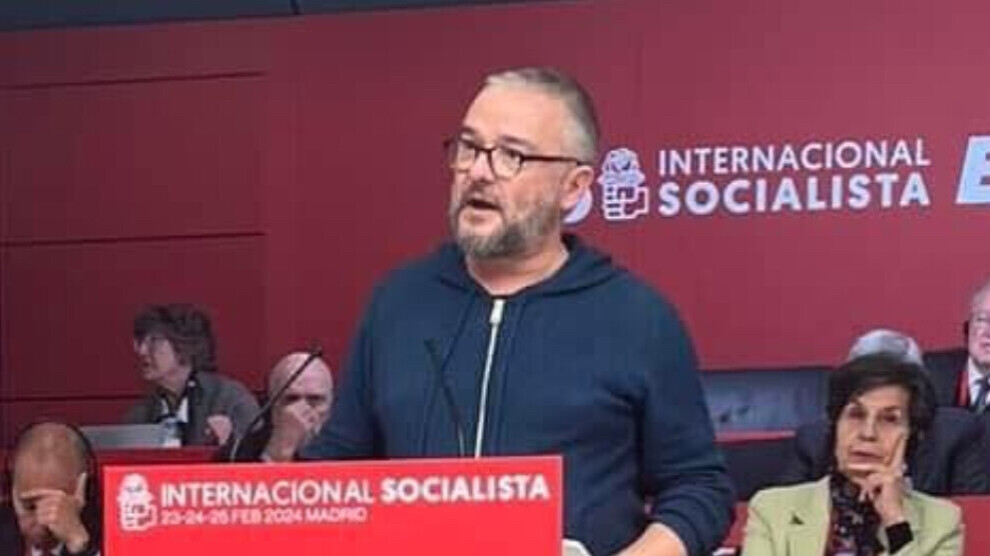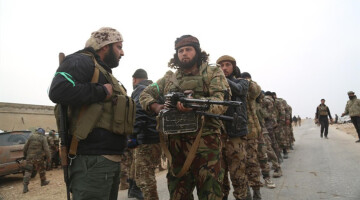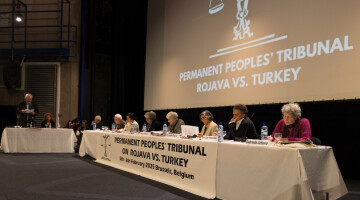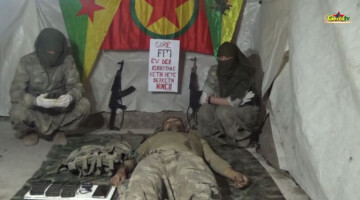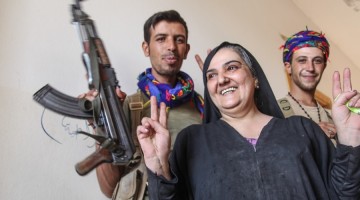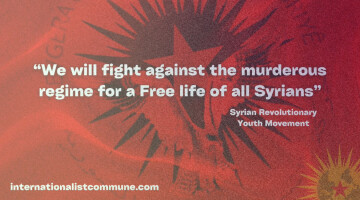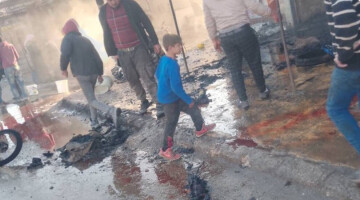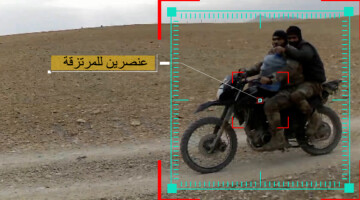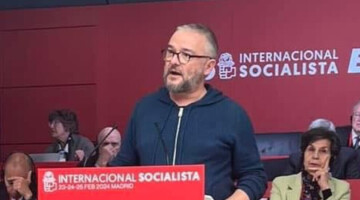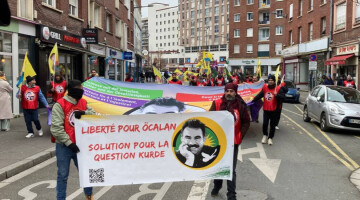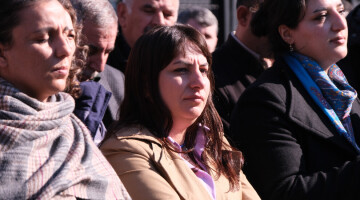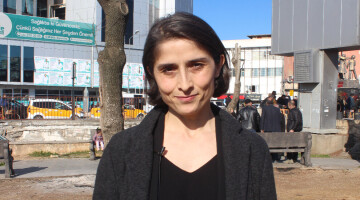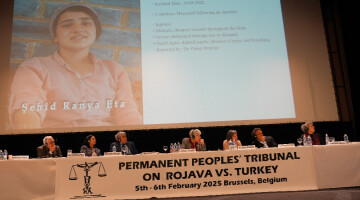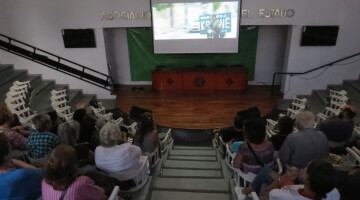Following the fall of the Ba'ath regime on 8 December 2024, discussions on Syria's future under the rule of Hay'at Tahrir al-Sham (HTS) continue. Meanwhile, the Turkish state, which remains an occupying force in Syrian territory, is not only using its influence over the new Damascus government against the Kurds but is also continuing its occupation attacks on the Autonomous Administration of Northern and Eastern Syria through its proxies, the so-called Syrian National Army (SNA).
Despite these attacks, resistance in the region continues. Fighters of the Syrian Democratic Forces (SDF) and local communities have established a defense line in Tishrin and Qereqozax against the Turkish state's expansionist plans.
In the past weeks, various delegations consisting of politicians, parliamentarians, and intellectuals from around the world have been conducting visits to Northern and Eastern Syria. Delegations from Italy and France traveled to Rojava, engaging in various diplomatic meetings and gaining firsthand insights into the situation on the ground. Among those traveling to Rojava was Dylan Boutiflat, the International Relations Secretary of France’s Socialist Party. ANF spoke with him about the visit, the unfolding developments in the region, and the international community’s stance.
You recently traveled to the Autonomous Administration of Northern and Eastern Syria as part of a French delegation consisting of politicians, parliamentarians, intellectuals, and journalists. What was the main purpose of the visit, how did it unfold, and what were your initial impressions?
We were invited by the Autonomous Administration of Northern and Eastern Syria. For several months, alongside members of the Nouveau Front Populaire (New Popular Front), political figures, and elected representatives from the French left, we had been planning to visit the region to meet with the leadership of the Autonomous Administration, as well as the military forces of the Syrian Democratic Forces (SDF), YPG, and YPJ.
Our primary goal was to witness firsthand the situation of our Kurdish friends and, more broadly, our friends within the Autonomous Administration. For years, we have supported them from afar, condemned the injustices they face, and received reports from them, particularly regarding the Turkish military presence and occupation. But we wanted to see these realities.
As for our first impressions, what stood out the most was witnessing first-hand the war and mobilization led primarily by women against Turkish occupation forces and their proxies. We wanted to see this resistance.
Having had the opportunity to visit war-torn areas, I clearly felt both the pressure of the urgent need for humanitarian aid and security, as well as the extraordinary resilience, determination, and resistance of the people.
At Tishrin Dam and on the battlefield, we saw civilians and local communities on the front lines of the struggle. Every day, men and women fight to ensure access to water and prevent Turkish forces and their proxies from seizing control of their territories. Civilians, political actors, and military forces are fully mobilized not only to defend the security of the region but also to sustain life and ensure the continuation of daily existence despite the ongoing conflict.
From this perspective, it is truly commendable. This resistance is a lesson in humility and a deep sense of responsibility, because it is impossible to just sit around doing nothing. What is happening in Rojava and across Syria clearly demonstrates that, even after the fall of Bashar al-Assad, the situation has not improved for the people. They still have to fight to survive. Turkish drone strikes and bombardments continue relentlessly.
These attacks by the Turkish state are not limited to border areas. While we were in Qamishlo, just a few kilometers from the Turkish border, we could feel the impact of these assaults. Similar attacks are ongoing around Kobanê.
Moreover, the conflict is not confined to the Autonomous Administration regions alone. We have learned that clashes are also occurring among the forces that contributed to the downfall of Bashar al-Assad in Damascus. As French and European observers, it is both significant and deeply saddening for us to witness that, even 10 years after the liberation of Kobanê, war persists in the region. Civilians remain on the frontlines just to survive, and they are particularly targeted by Turkish forces.
The fate of displaced people, including those from Afrin under Turkish occupation, as well as many other refugees seeking shelter, whether in camps or in more dignified living conditions, remains uncertain.
As part of our visit, we also traveled to Raqqa, where we met with displaced individuals from Afrin. We witnessed firsthand the suffering these people endure. The most significant takeaway from this visit was a profound sense of humility and responsibility. This experience reinforces our commitment to mobilizing even more actively for and alongside our friends in Kurdistan, particularly in Rojava, in the future.
In addition to your institutional engagements, you also met with the local population and visited cities like Kobanê, which have become symbols of the Rojava Revolution. What would you like to say about these visits?
What deeply moved me was Rojava's unique characteristic as a multicultural society where power is shared between men and women. Every community, whether ethnic or religious, contributes to the collective project in Rojava and is an integral part of this democratic structure. We had heard a lot about the system in Rojava, but this time, we witnessed it with our own eyes. We met with many actors from civil society.
In particular, we had meetings with women whom I would describe as ambassadors of dialogue among the residents of the region, especially in Raqqa. Despite the military defeat of ISIS, its influence still lingers in the region, and these women are leading the struggle for freedom. The reactionary mindset of ISIS continues to hold a strong grip on societies, and the threat of jihadist ideology is felt everywhere. The women of Raqqa are waging a strong and determined resistance against this ideology.
As someone who has previously been in red zones such as the Sahel or other regions of the Near and Middle East, I have never felt such a daily sense of pressure. Our friends and the people of this region live under the constant threat of military aggression from Turkey, jihadists, and various militia groups.
Adding to this is the fact that these regions have already paid a heavy price in human lives, and now, their very existence remains under constant threat.
For example, we visited the cemetery in Kobanê, and that moment deeply moved me. The arrangement of the graves reminded me of the images I had seen when I visited the Verdun war as a young man. You get the impression that these massacres and endless wars persist due to the indifference of the international community.
Moreover, I wanted to observe how the people we spoke with, whether from the Autonomous Administration or the military forces, particularly the SDF, perceive Emmanuel Macron’s support. Many openly shared their thoughts with us, and we, in turn, tried to clarify France’s current position and commitment. A common sentiment was that while President Macron has demonstrated goodwill, he has neither explicitly condemned the war crimes committed by Turkey and its affiliated gangs nor taken a clear stance against their ongoing attacks.
Ten years ago, we defeated the jihadist ideology in Kobanê by fighting against ISIS. However, today, we are confronted with another theocratic and reactionary force that seeks to impose its model not only on Rojava but on the entire region. This dark force is the power of Erdoğan, who is now actively working to shape the fate of Rojava and Syria according to his own agenda. We cannot allow this to happen.
As you mentioned, while the future of a new Syria is being discussed in Damascus, on the other hand, the Turkish state and its proxy groups are attempting to implement their war plans in Rojava. Meanwhile, the international community has yet to take a clear stance against these attacks. How do you evaluate this approach?
There are many ongoing uncertainties between Europe and Turkey. Turkey is a country situated at the crossroads of Europe and Asia, at the intersection of societies, histories, and cultures. For this reason, the prevailing perspective is to maintain strong ties with Turkey. I, too, believe that French-Turkish relations are important, but not with Erdoğan's government.
The core of the ambiguity in the stance towards Erdoğan lies in his ability to manipulate Europe through migration policies. He uses this issue as a bargaining tool with European leaders, making himself indispensable in managing migration and leveraging it for his own benefit. He is monetizing his role by implying that if Europe stops turning a blind eye to the violations committed in southern Turkey and the territories under Syrian sovereignty, he will allow jihadists to enter Europe and use migration as a tool of pressure.
We believe that Erdoğan is trying to demonstrate that his power holds a key role in all geopolitical issues where Turkey seeks to assert its influence. Whether it is the war in Ukraine, Russian aggression, the transportation of Ukrainian grain through the Bosphorus, military operations within NATO, or the use of energy resources passing through Turkey as a pressure tool, Erdoğan exploits all these factors to influence our diplomacy and international policies. More importantly, he uses them to prevent support for the forces that are closest to our values.
What angers me even more is the hypocrisy towards the Kurds, who have made the greatest sacrifices in the fight against ISIS in Syria, Rojava, and Iraq. Today, we are turning our backs on the Kurds, who have been at the forefront against ISIS, in the face of Erdoğan's islamic reactionism and the state terrorism carried out by his intelligence services.
We must put an end to this hypocrisy, openly condemn all of Erdoğan's violations, and tell him to stop.
During our visit, I also had the impression that the French were perceived as unreliable interlocutors. Two members of parliament representing all the parties within the New Popular Front, which has mobilized in solidarity with our Kurdish friends in Rojava, accompanied us. Nevertheless, France is seen as a country that makes statements but does not act consistently in line with them.
In the coming days, we will attempt to take initiatives to call on the French public authorities, particularly the President and the executive branch surrounding the government. However, we also aim to raise awareness among the French public about the dual role that France plays in this region.
Considering the structure of the jihadist organization HTS, which has seized power in Syria, what is its political and social legitimacy among the different communities in Syria? Do you think a new Syria is possible under the HTS?
In recent times, we have witnessed the entire international community recognizing HTS leader Abu Mohammad al-Jolani as the President of Syria. The fact that there is now someone to engage in dialogue, that this person is no longer Bashar al-Assad, that he makes commitments to the international community and follows through on them, and most importantly, that he respects Syria’s diversity and the ability of its people to coexist in the new Syria that is being built this is a positive development.
This is what I refer to as the democratic process of the constitution. Today, we must reaffirm that if a model of Syrian democracy is to emerge, it will undoubtedly have to rely on the experience of the Rojava project, and specifically the Autonomous Administration of North and East Syria. This administration has demonstrated the capacity to construct a multicultural society with different and complementary forces while simultaneously ensuring its own security.
Because, as you have also observed, in Damascus today, behind the speech of this new leader whom I struggle to refer to as a president, there is already a premature call for the unification of military forces under a single Syrian army. I believe there are significant steps to be taken before reaching such a point. There must be respect for cultural diversity and for the forces that brought about Assad’s downfall. After all, I do not believe that the HTS contributed more than others in toppling Bashar al-Assad. This regime was overthrown as a result of the struggles of many, including Arab forces, militants, Alawite citizens, and above all, the Kurdish people.
I firmly believe that the system we need to work on for Syria’s future should be based on a democratic confederal project. In addition to respecting Syria’s territorial integrity and sovereignty, it is essential to recognize the country’s diversity and its ability to organize within a confederal model. It will be necessary to later discuss whether we will need a common army, a unified justice system, or a shared police force, questions that should be addressed within the framework of Rojava’s experience and political project, which could serve as a foundation and accompany this process. These issues will inevitably come up at some point, but it is essential that all civil, social, political, and military forces be included in this discussion.
France will be hosting a conference on the future of Syria at the Élysée Palace on February 13. I believe that all these issues will be addressed in this meeting. We are calling on President Macron to ensure that this discussion is not limited to the new leadership in Damascus but also includes representatives from all regions of Syria. In particular, officials from the Autonomous Administration of North and East Syria must be present. If President Macron does not invite the representatives of the Autonomous Administration to participate in the Élysée conference, we will invite them to the National Assembly and ask them to propose speaking in the French Parliament.
The democratic model implemented in Northern and Eastern Syria actually presents a significant blueprint for Syria’s future. While many acknowledge its importance, international powers hesitate to openly discuss this project. How should this stance be evaluated?
Personally, I believe that first and foremost, there needs to be a discussion about Syria’s territorial integrity and sovereignty. However, alongside this, there should also be a debate recognizing the legitimacy of the Kurds' authority over their own land. In my opinion, the first priority should be bringing all parties together to stabilize the Syrian state.
Just as democracy has been built in Rojava, it is possible to establish democracy throughout Syria. Rojava embodies all the democratic principles, including pluralism of ideas, freedom of expression, and gender equality. This model can be extended to the entirety of Syria. I strongly believe that democratization must occur in phases and should not be imposed through a Western vision. It must come from within from the Kurds, Alawites, Arabs, Syriacs, and all the communities that make up Syria.
If external forces decide what kind of Syria should emerge, we will witness failures similar to what we have seen in Israel and Palestine or in Lebanon over the past few years. It is not for us to decide on behalf of the Syrian people or the people of Rojava; everyone must have a say. Our role should be that of facilitators and mediators. Dialogue must take place, and even if negotiations happen, the people of Syria and Rojava must determine their own future. For this, a constitutional process and elections are essential.
What are your plans as a committee for the next steps? Will you undertake any initiatives to help protect Rojava?
Yes, absolutely. We will take the initiative. In the coming days, we will widely share our observations from the region with the public.
Parallel to the conference on the future of Syria, which will be held at the Élysée Palace on 13 February, we will organize an initiative in the National Assembly. In addition to these efforts, it is important for us to raise awareness about Rojava among the French public. We will carry out many initiatives to foster this awareness.

